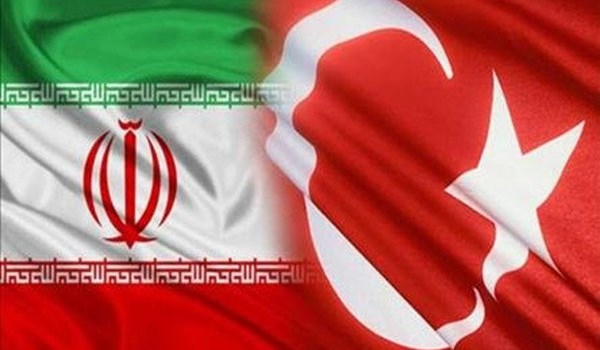
Iran, Turkey to Further Ease Border Trade


The 48th subcommittee of Iran and Turkey on border security convened in Turkish border province of Hakkari on Saturday.
The Iranian delegation was headed by Governor-General of West Azerbaijan province Alireza Mohammadizadeh, and the Turkish delegation was headed by Hakkari Governor Idris Akbiyik, according to a statement by Hakkari governorate.
During the subcommittee session, the two sides discussed obstacles on the way of border trade, and ways to resolve them, the announcement said.
The statement added that the two delegations also signed a protocol but it did not to elaborate on the details of it.
It said the two sides underlined the need for further cooperation and good neighborliness.
Earlier on December 20, Tehran and Ankara jointly denounced the US withdrawal from the nuclear deal of July 14, 2015, and said that Washington’s unilateral sanctions against Iran are destructive for the economy of the whole region.
Iran and Turkey agreed to step up their economic cooperation with the aim of reaching a $30-billion target set for their annual trade.
The agreement was reached at the 5th Meeting of High Council for Iran-Turkey Strategic Cooperation in Ankara chaired by Iranian President Hassan Rouhani and his Turkish counterpart, Recep Tayyip Erdogan, according to a joint statement issued at the end of the event.
Tehran and Ankara, the statement added, called for closer bilateral relations in all areas, especially economy, politics and fight against terrorism, saying enhanced ties between the two neighbors will contribute to the region's peace and stability.
They emphasized the need to promote the existing trade mechanisms between the two neighboring states so they could speed up efforts to increase the volume of their annual to the $30 billion target they had previously set.
The two sides further criticized Washington's decision to scrap the 2015 multilateral deal on the Iranian nuclear program -- officially called the Joint Comprehensive Plan of Action (JCPOA) -- in defiance of UN Security Council resolution 2231, which has endorsed the international document.
They also expressed concerns over the unilateral sanctions that the US reinstated against Iran in the aftermath of its withdrawal from the JCPOA, saying the unfair restrictive measures could harm innocent people and leave a negative impact on regional economic relations.
Iran and Turkey also called for all-out efforts to protect the nuclear deal, which they hailed as the fruit of multilateral diplomacy on the world stage.
Iran and Turkey -- which serve, together with Russia, as mediators of a peace process on Syria -- reaffirmed their commitment to protecting the crisis-torn country's sovereignty, territorial integrity and political unity.
They praised the achievements of the peace process which has been underway between Syria's warring parties in Astana, Kazakhstan, since January 2017, saying negotiations should continue in parallel with counter-terrorism battles in an effort to find a peaceful solution to the crisis in the Middle Eastern country.
Before leaving Tehran for Ankara, Iranian President Rouhani underlined that he was slated to meet Turkish officials to discuss ways to boost the two countries' trade ties up to $30bln.
Matters of mutual interest as well as regional and international developments would be on the agenda of talks between the two sides during the visit, Rouhani said in Tehran.
Rouhani also said promotion of economic relations, including in the banking system, energy sector, oil and gas and transit, would be discussed and certain agreements would be signed during his visit.
He said efforts to increase bilateral annual trade from $10bln to $30bln would be among his top agenda of discussion.
He said that Turkey, as friendly key regional player, was of high significance to Iran.
Turkish officials, including President Erdogan, have criticized the US for re-imposing its unilateral sanctions against Iran, stressing Ankara’s determination to keep economic ties with Tehran.


Newmont nets $100M payment related Akyem mine sale

First Quantum scores $1B streaming deal with Royal Gold

Caterpillar sees US tariff hit of up to $1.5 billion this year

Gold price rebounds nearly 2% on US payrolls data

Copper price collapses by 20% as US excludes refined metal from tariffs

St Augustine PFS confirms ‘world-class’ potential of Kingking project with $4.2B value

B2Gold gets Mali nod to start underground mining at Fekola

Goldman told clients to go long copper a day before price plunge

Copper price posts second weekly drop after Trump’s tariff surprise

Codelco seeks restart at Chilean copper mine after collapse

US slaps tariffs on 1-kg, 100-oz gold bars: Financial Times

BHP, Vale offer $1.4 billion settlement in UK lawsuit over Brazil dam disaster, FT reports

NextSource soars on Mitsubishi Chemical offtake deal

Copper price slips as unwinding of tariff trade boosts LME stockpiles

SAIL Bhilai Steel relies on Danieli proprietary technology to expand plate mill portfolio to higher steel grades

Alba Discloses its Financial Results for the Second Quarter and H1 of 2025

Australia weighs price floor for critical minerals, boosting rare earth miners

Australia pledges $87M to rescue Trafigura’s Nyrstar smelters in critical minerals push

Fresnillo lifts gold forecast on strong first-half surge

US slaps tariffs on 1-kg, 100-oz gold bars: Financial Times

BHP, Vale offer $1.4 billion settlement in UK lawsuit over Brazil dam disaster, FT reports

NextSource soars on Mitsubishi Chemical offtake deal

Copper price slips as unwinding of tariff trade boosts LME stockpiles

SAIL Bhilai Steel relies on Danieli proprietary technology to expand plate mill portfolio to higher steel grades

Alba Discloses its Financial Results for the Second Quarter and H1 of 2025

Australia weighs price floor for critical minerals, boosting rare earth miners

Australia pledges $87M to rescue Trafigura’s Nyrstar smelters in critical minerals push

Fresnillo lifts gold forecast on strong first-half surge














